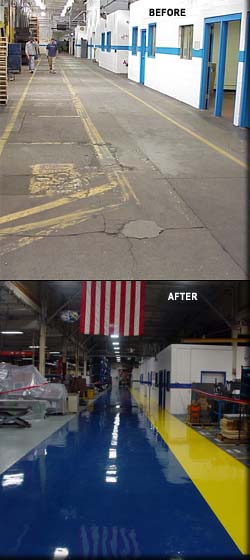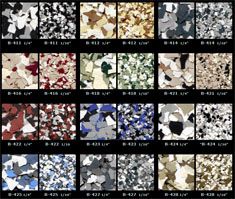Resinous System Selection
 There
are overlaps in recommended system applications; however, select types of
chemistries are generally used for specific environments. Whether the system
selection is dependent on exposure to harmful liquids or excessive abrasion due
to wear, the ultimate abuse the surface will experience must be understood to
ensure a successful installation.
There
are overlaps in recommended system applications; however, select types of
chemistries are generally used for specific environments. Whether the system
selection is dependent on exposure to harmful liquids or excessive abrasion due
to wear, the ultimate abuse the surface will experience must be understood to
ensure a successful installation.
The selection process begins after a thorough new assessment is done and a full evaluation checklist is created of the potential abusive agents (extreme chemical exposure, light-to-heavy duty wear, wheeled traffic from rubber and / or steel wheel, floors exposed to extreme temperatures or thermal cycling that can cause thermal shock. There may be several types of polymeric industrial flooring systems available to match the job.
In general, system thickness, installation time, chemical resistance, cost, thermal shock resistance, and life expectancy increase as one moves from coatings, to slurries, to broadcast systems, to trowel applied floors. Each of these installation methods use a variety of chemistries. The properties that the chemistry controls are chemical resistance, adhesion, mechanical properties such as tensile and compressive strength, weather-ability, shrinkage, and speed of cure.
Sealers - are generally classified and any concrete coating product that is less than 3 mils in thickness and designed to inhibit absorption of liquids into the concrete. Hardeners are classified as a product that penetrates into the concrete to create a more watertight surface and/or to strengthen the concrete. Acrylic sealers are the most common type of sealer. They are very economical and easy to install. These are often used as a curing compound. (See curing compounds) more info on sealers.
Coatings - are an economical, thin-mil system providing chemical resistance, ease of cleaning, and a non-dusting surface. Applications include areas exposed to chemical splash or spill and light-to-moderate traffic. Because coatings are typically 40 mils or less, they will not hide or mask surface imperfections beyond he system thickness unless previously repaired. They will not provide slope or pitch to drain, rather they follow the contour of the substrate. Coatings withstand only light thermal shock. Many base chemistries are available to choose from to meet specific chemical resistance.
Broadcasts - are an economical flooring system using fine aggregate granules combined in a resin matrix. Broadcasts provide good skid inhibition and chemical resistance. Applications include areas experiencing light-to-moderate chemical, impact, and traffic exposure. Full 1/8" to 3/16" broadcast systems can be used in many of the applications where 1/4" mortar systems were previously specified. As is the case with coatings, many base chemistries are available to choose from to meet specific chemical resistance. Slurry Broadcast systems will mask minor surface imperfections.
Thick-Mil Troweled - systems employ a mortar material with aggregate fillers in a resin matrix for maximum strength and protection. This approach provides high impact resistance, level surface, easy maintenance, good skid inhibition, and resistance to thermal shock, or chemicals. Mortar systems are often used to re-pitch floors to provide slope to drain.
Thin Or Thick-Mil Broadcast / Troweled - is a mortar-like system with highly decorative aggregates combined in a resin matrix. Applications include areas needing highly decorative surfaces and resistance to wear and chemical attack.
Service / Market Area:
For industrial and commercial flooring projects we work in Michigan cities such as Muskegon, Grand Haven, Norton Shores, Big Rapids, Cadillac, Reed City, Howell, Lansing, Jackson, Battle Creek, Kalamazoo, Hastings, Plainwell, Otsego, South Haven, Benton Harbor, St Joseph, Holland, Grand Haven, Grand Rapids, Wyoming, Kentwood, Grandville, Portage, Walker, Byron Center, Cascade Township, and Ada. For residential garage projects we generally only bid on work within 30 miles of Grand Rapids, MI.


